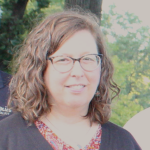 By Lyndell Campbell-Réquia
By Lyndell Campbell-Réquia
NAB Missionary to Brazil
You would think the greatest challenge cross-cultural missionaries face is learning a new language. While that certainly is one of the big ones, getting my driver’s license in Brazil was no easy feat.
Before going to Brazil, I had legally driven in Canada for eighteen years with zero traffic violations; I passed my driver’s test on the first try when I took it. When I moved to Brazil, I was given access to a car and had been driving there, too, for four years before it was finally necessary to get my Brazilian driver’s license.
I thought it would just be a matter of showing up with my Canadian driver’s license and they would issue the Brazilian equivalent on the spot. However, my Canadian license was not accepted, so I had to start from scratch to earn my license in Brazil. I spent hours in class, took a multiple-choice test, underwent a medical exam and a psychotechnical evaluation, and then spent more hours in a car learning how to re-drive in a country that was not my own. It took almost a year and three tries at the practical driving test before I received a one-year probationary license.
The whole process was humbling and ended up being an important part of integrating into the Brazil culture. I knew how to drive in one context. However, it was essential for me to learn there are many more ways to drive than just my way. And if I am being honest, driving the way I had learned and practiced for so many years was not the best way to drive in Brazil.
How we interpret the Bible is not much different because our approach to Scripture is based on our context, culture, and perspective. Serving the Lord for twenty years in a culture that is not my own, I see him in a way I never would have had it not been for my Brazilian brothers and sisters. When my context changed, my perspective changed as well. My understanding of God is much broader and deeper than it was before. Instead of imposing the way I was taught to interpret Bible on other cultures as the only way or best way, I have come to recognize God is already present in all people groups, illuminating his word in a way they can recognize and put their faith in him.
The more we connect with our brothers and sisters around the world, and even different cultures in our own neighbourhoods, the more our understanding of God and his word grows, as each group reveals their own understanding and perspectives of him.
For example, how do different cultures interpret the reason Jesus died on the cross? In North America, we typically answer “to forgive our sins,” which is true. Other cultures would say to restore our honor, and still others would answer to free us from fear.[1] Each of these is true as well. Even though the focus is different, each of these perspectives is correct. This is the beauty of the global church: the coming together of all nations, races, tongues, and tribes to know God and give him glory and service (Revelation 7:9–10). Making these significant connections is becoming more and more important as the center of Christianity is no longer North America, and as we live in an increasingly pluralistic environment in North America. “Christianity is no longer a Western-majority faith, as most Christians today live in Asia, Africa, and Latin America.”[2]
As we seek to expand our vision for interpreting God’s word, I want to welcome you to the conversation. Please join Wayne Stapleton (VP of Cross-Cultural Engagement and Emerging Leader Engagement), Dr. Larry W. Caldwell (professor of Intercultural Studies and Bible Interpretation at Kairos University), Bethany Kaposhi (Cross-Cultural Engagement Team member) and me, Lyndell Campbell-Réquia (missionary to Brazil, professor of Biblical Interpretation), for a webinar on February 16 at 10:00 am PST.
[1] Jayson Georges, The 3D Gospel: Ministry in Guilt, Shame, and Fear Cultures (Time Press, 2017), 13.
[2] Gina Zurlo, Global Christianity: A Guide to the World’s Largest Religion from Afghanistan to Zimbabwe (Zondervan Academic, 2022), xv.
